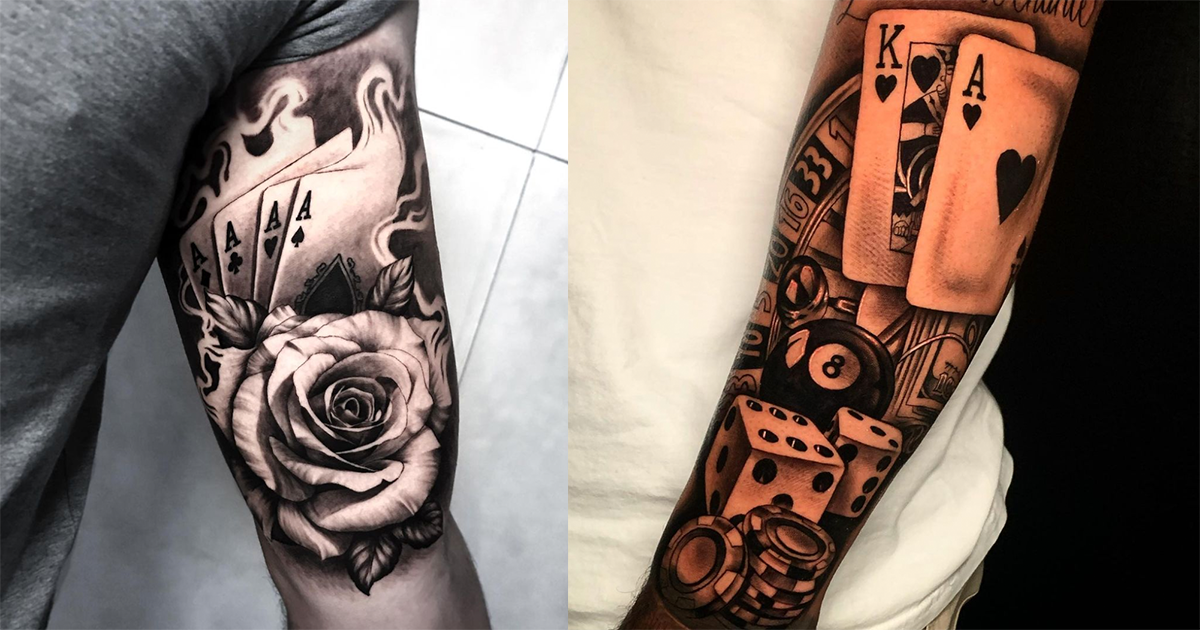Inked Mag Staff
March 6th, 2020
How a Simple Tattoo Can Help Kick a Serious Gambling Addiction
What does getting inked have in common with gambling? Quite a lot, it turns out.
What does getting inked have in common with gambling? Quite a lot, and in more ways than one as well! For instance, if you win a pile of cash at the tables of a casino, you can get a swanky tattoo to celebrate that moment.
Even if you don’t have a memorable moment to celebrate, gambling artifacts like dice and cards make for great tattoo themes. But gambling tattoos can also have a much darker connotation, like in the life of this particular guy from Manchester.
A tattoo that reminds you of rock bottom
Folks often get important dates inked on their bodies, as an act of remembrance. It could be the day your kid was born or the day you met the love of your life. But not all tattoo dates are about positive memories.
They can also be about losses and past mistakes that you don’t want to repeat. The tattoo on the hand of Alex Woolliscroft belongs to this latter category. It is a pretty simple job, done in basic Arabic numerals we use in everyday life – nothing fancy.
Folks who see it will not even think twice about it. But the personal significance of those numbers to Alex is huge. It reminds him of that fateful day in September 2012 when he hit rock bottom.
The 33-year-old barber from Stockport is a recovering addict. His gambling problem led to massive financial loss over the years, worth tens of thousands of pounds. On that fateful day, Alex lost £700 on a fixed-odds betting terminal or FOBT. It took him just two spins on the machine.
The problem with FOBTs in the UK
FOBTs are nothing but a species of slot machines, quite popular in the United Kingdom. Introduced in 2001 thanks to an overhaul of the gambling laws in the country, they have become monstrously popular.
In fact, they have been given the infamous moniker – the “crack cocaine” of gambling due to their addictive potential. Alex got hooked on these machines as a teenager. Unfortunately for him, the betting limits did not exist on FOBTs in 2012 when he lost all that money in just two spins.
That episode may have helped turn his life around, forcing him to go to Gamblers Anonymous meetings. Eventually, he kicked the habit, and now the tattoo helps him stay on the level. But many others are not as lucky as Alex.
Gambling addiction is a huge issue in the UK, one of the largest regulated markets in the world. The government figures suggest that over 600,000 people are problem gamblers, and many of them are hooked to FOBTs.
Why are FOBTs so addictive?
Slot machines are widely available all over the world. They have been around for well over three decades, available in casino destinations like Las Vegas, Monaco, and Reno. But FOBTs are not restricted to UK casinos – they can be found in small betting shops all over the place.
This makes them highly accessible, even more than casinos and other forms of online gambling. In fact, even though it was very easy to find a no deposit online casino five or 10 years ago, many players like Alex still preferred going out to a local shop and dropping cash on an FOBT.
This is unfortunate because online casinos and video slots offer better odds to players. In FOBTs, the win percentage for players, also called RTP, is between 90 and 94%. In most online slots, this can go above 95%.
Though they have a design similar to casino slot machines, with touch screens and cash deposits, FOBTs usually have roulette games instead of spinning reel slots. They were addictive for kids like Alex because they could wager anywhere from £1 to £100 or more on these machines.
Often, Alex would leave a betting shop with £150 or more, a crazy amount for a teenager to have. This is the reason why FOBTs are so addictive, despite their relatively low RTP when compared to online slots.
The British government has responded to the situation in recent years. They initially set the maximum betting limit at an FOBT to £100, before finally bringing it down to just £2. In 2020, players will no longer face the situation Alex found himself all those years ago in 2012, losing a massive amount in a matter of seconds.
Can tattoos really help you kick the habit?
There is a good reason why gambling is considered an addiction. People who suffer from problem gambling often have relapsed after quitting – they fall back to the reckless betting habits of old. Having a tattoo associated with a painful memory can be hugely beneficial here.
A tattoo like the one on Alex’s hand can have a powerful impact on impulse control. Most of the episodes of relapse for addicts happen due to poor impulse control. Reminding yourself of the reason why you quit in the first place can help put a stop to this.
The choice of tattoo design and its placement also matters. For Alex, the placement of the tattoo on the arm is a very sensible move – it is the first thing he will probably see when reaching for a betting machine!
So yeah, having a meaningful tattoo somewhere that you can see readily can help you a lot in dealing with your addiction. It doesn’t have to be anything like Alex’s tattoo either. You can also go for more elaborate and inspiring designs, like something that reminds you of the important people in your life.
But a tattoo alone cannot help you deal with a problem like this. If you think you have any gambling related issues, get in touch with a support organization like Gamblers Anonymous, or BeGambleAware for best results.
The preceding article is a sponsored post.
Editor's Picks
Bridging Classical Art and Modern Tattooing
Esteban Rodriguez brings the discipline of classical fine art to the living canvas of skin, creating hyper-realistic tattoos that merge technical mastery with emotional depth.
Show Your Ink Fashions Brings Custom Style to Tattoo Culture
Show Your Ink Fashions creates custom shirts designed to showcase your tattoos as wearable art, blending fashion with personal expression.
The Ultimate “Superman” Tattoo Roundup: Just in Time for Superman’s Return to Screens
With Superman’s big return to theaters, fans are revisiting some of the most iconic ink inspired by the Man of Steel.














